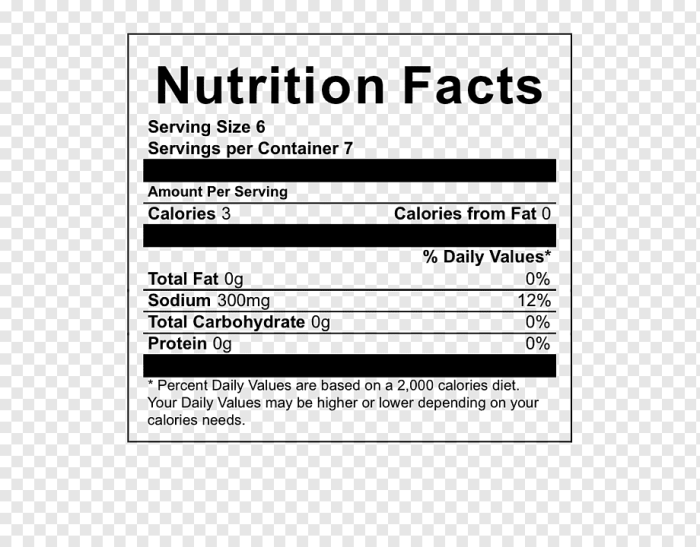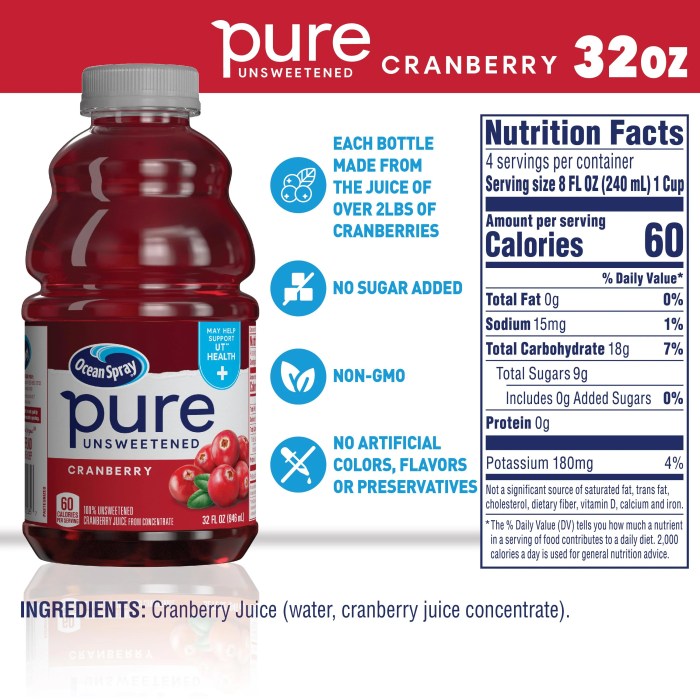Nutritional Composition of Brisk Tea

Brisk tea nutrition facts – Brisk tea, encompassing a wide variety of black, green, and herbal infusions, offers a complex nutritional profile beyond its stimulating effects. Understanding the nutritional content of different types and brewing methods is crucial for appreciating its potential health benefits and tailoring consumption to individual needs. This section details the typical nutritional composition and explores the factors influencing its variability.
Nutritional Content of Brisk Tea
The nutritional content of brisk tea varies significantly depending on the type of tea and brewing method. However, a standard 8-ounce cup of brewed black tea generally provides a modest amount of nutrients. The following table offers a representative overview, keeping in mind that these values can fluctuate considerably.
| Nutrient | Amount per Serving (8 oz) | % Daily Value | Unit of Measure |
|---|---|---|---|
| Caffeine | 30-50 mg | Varied; depends on individual tolerance and daily intake | mg |
| Antioxidants (e.g., flavonoids) | Variable; depends on tea type and brewing method | Significant contribution to daily intake | mg (varies greatly) |
| Fluoride | Trace amounts | Negligible | mg |
| Minerals (e.g., manganese, potassium) | Trace amounts | Negligible | mg |
*Note: Daily Value percentages are estimates and can vary depending on individual dietary needs and recommendations.* The amount of antioxidants, specifically flavonoids, is a key variable influenced by factors detailed below. Precise quantification of antioxidants is complex and requires advanced analytical techniques.
Variations in Nutritional Content Based on Tea Type
Black, green, and herbal teas exhibit distinct nutritional profiles. Black teas, having undergone full oxidation, generally contain higher levels of theaflavins and thearubigins, which are potent antioxidants. Green teas, minimally processed and unoxidized, are richer in catechins, another class of antioxidants. Herbal infusions, not technically teas (as they do not originate from theCamellia sinensis* plant), offer a wide range of phytochemicals depending on the herbs used, potentially including vitamins, minerals, and other bioactive compounds.
For instance, chamomile tea may be a source of apigenin, a flavonoid with potential anti-inflammatory properties, while peppermint tea may contribute to digestive health.
Impact of Brewing Methods on Nutritional Profile, Brisk tea nutrition facts
Brewing time and temperature significantly affect the extraction of compounds from tea leaves. Longer brewing times and higher temperatures generally lead to a more concentrated brew, increasing the extraction of caffeine, antioxidants, and other bioactive compounds. However, excessive brewing can also lead to the extraction of bitter tannins, potentially impacting the taste and potentially increasing the likelihood of gastrointestinal upset in some individuals.
Conversely, shorter brewing times and lower temperatures result in a milder brew with less intense flavors and potentially lower concentrations of bioactive compounds. The water used also plays a role; filtered water is preferred to avoid the potential introduction of undesirable minerals or chemicals.
Health Benefits Associated with Brisk Tea Consumption: Brisk Tea Nutrition Facts
Brisk tea, a type of black tea, offers a range of potential health benefits stemming from its unique chemical composition, particularly its high concentration of antioxidants. While individual responses may vary, consistent consumption, as part of a balanced diet and healthy lifestyle, may contribute to improved well-being. It’s crucial to remember that these benefits are not guaranteed and should not replace medical advice.
The purported health advantages of brisk tea are largely attributed to its bioactive compounds, including polyphenols, flavonoids, and theaflavins. These compounds exhibit potent antioxidant properties, neutralizing harmful free radicals that can damage cells and contribute to chronic diseases. Furthermore, research suggests that brisk tea consumption may positively influence several aspects of health.
Antioxidant Properties and Their Role in Overall Health
The high antioxidant content in brisk tea is a key factor in its potential health benefits. Antioxidants combat oxidative stress, a process linked to aging and various health problems. Theaflavins, a class of polyphenols unique to black tea, are particularly potent antioxidants. Studies have shown that these compounds can protect against cellular damage caused by free radicals, potentially reducing the risk of chronic diseases such as heart disease and certain cancers.
Brisk tea, a popular beverage, offers a modest nutritional profile, primarily consisting of antioxidants and hydration. For those seeking a dairy-free alternative to complement their brisk tea, understanding the nutritional content is key; check out the detailed breakdown on almond milk almond breeze nutrition facts to see how it compares. Returning to brisk tea, remember to consider its caffeine content alongside your overall daily intake.
For instance, a study published in theJournal of Agricultural and Food Chemistry* demonstrated the significant antioxidant capacity of theaflavins compared to other tea types. The precise mechanisms by which these antioxidants exert their protective effects are still under investigation, but the evidence strongly suggests a beneficial role in maintaining overall health.
Potential Health Benefits of Brisk Tea Consumption
Numerous studies have explored the potential health benefits linked to brisk tea consumption. While more research is needed to definitively establish cause-and-effect relationships, the existing evidence suggests several potential advantages:
- Cardiovascular Health: Some studies suggest that regular brisk tea consumption may contribute to improved cardiovascular health by lowering blood pressure and improving cholesterol levels. This effect is potentially linked to the presence of flavonoids and other bioactive compounds.
- Improved Brain Function: The caffeine and L-theanine in brisk tea may enhance cognitive function, improving alertness, focus, and mood. However, excessive caffeine intake can lead to adverse effects, so moderation is key.
- Reduced Risk of Certain Cancers: The antioxidant properties of brisk tea, particularly the theaflavins, may help protect against cellular damage linked to cancer development. However, it’s crucial to note that brisk tea is not a cure for cancer and should be considered as part of a broader strategy for cancer prevention.
- Enhanced Immunity: Some evidence suggests that brisk tea may have a positive impact on the immune system, potentially boosting the body’s ability to fight off infections. This benefit is likely related to the presence of various immune-modulating compounds.
Comparison of Brisk Tea’s Health Benefits with Other Beverages
Compared to other popular beverages, brisk tea offers a unique combination of benefits. While coffee also contains caffeine and antioxidants, brisk tea boasts a different profile of polyphenols, including theaflavins, not found in coffee. Similarly, while green tea is rich in other types of antioxidants, brisk tea’s theaflavins offer a distinct set of potential health advantages. Fruit juices, while containing vitamins and antioxidants, often contain high levels of sugar, unlike brisk tea, which is naturally low in sugar.
Therefore, brisk tea stands out as a relatively low-calorie, nutrient-rich beverage with a unique combination of bioactive compounds offering potential health benefits.
Potential Drawbacks and Considerations

While brisk tea offers several health benefits, excessive consumption or certain factors can negate these advantages and even pose potential health risks. It’s crucial to understand these drawbacks and make informed choices about incorporating brisk tea into your diet. This section will explore potential negative effects and considerations for responsible consumption.
The primary concern with brisk tea, as with most teas and caffeinated beverages, centers around its caffeine content. Excessive caffeine intake can lead to various adverse effects, depending on individual sensitivity. These effects range from mild jitters and insomnia to more serious issues like heart palpitations and anxiety. Furthermore, caffeine can interact negatively with certain medications, potentially reducing their effectiveness or increasing the risk of side effects.
It’s also important to remember that the caffeine content can vary depending on the brewing method and the type of brisk tea.
Caffeine Sensitivity and Medication Interactions
Caffeine’s stimulating effects are primarily mediated through its interaction with adenosine receptors in the brain. Individuals with pre-existing conditions such as anxiety disorders or heart conditions may experience exacerbated symptoms with high caffeine intake. Similarly, caffeine can interact with medications like certain antidepressants, blood thinners, and stimulants, potentially altering their efficacy or increasing the risk of adverse reactions.
For example, combining caffeine with certain medications can lead to increased heart rate or blood pressure, potentially causing discomfort or even serious health complications. Consult your physician if you have concerns about caffeine consumption, especially if you are taking any medications.
Impact of Added Sugar and Sweeteners
The addition of sugar or artificial sweeteners significantly alters the nutritional profile of brisk tea, diminishing its overall health benefits. While plain brisk tea is relatively low in calories and sugar, adding sweeteners can increase its caloric content and contribute to weight gain, increased blood sugar levels, and an increased risk of developing chronic diseases like type 2 diabetes.
The type of sweetener used also matters; high-fructose corn syrup, for example, is associated with more negative health consequences than other sweeteners. Opting for unsweetened brisk tea is the healthiest approach.
Factors to Consider Before Regular Consumption
Before making brisk tea a regular part of your diet, several factors warrant careful consideration. These include individual caffeine tolerance, pre-existing health conditions, medication interactions, and dietary preferences.
A personalized assessment is crucial. Start with small amounts of brisk tea to gauge your tolerance for caffeine and monitor for any adverse reactions. If you experience any negative effects, reduce your intake or discontinue consumption altogether. Consult a healthcare professional if you have any concerns about the potential impact of brisk tea on your health, especially if you have pre-existing health conditions or are taking medication.
Top FAQs
Is brisk tea good for weight loss?
Brisk tea itself doesn’t directly cause weight loss. However, it’s low in calories and can contribute to hydration, which is important for overall health and can indirectly support weight management efforts when combined with a balanced diet and exercise.
Does brisk tea dehydrate you?
No, brisk tea, like most teas, contributes to your daily fluid intake and helps with hydration. However, excessive caffeine intake can sometimes have a mild diuretic effect, so moderation is key.
Can I drink brisk tea before bed?
The caffeine content in brisk tea can vary. If you’re sensitive to caffeine, it’s best to avoid it before bed as it could interfere with sleep. Opt for decaffeinated varieties or herbal teas if you want an evening beverage.
What are the best types of brisk tea for antioxidants?
Generally, black and green teas are excellent sources of antioxidants. However, the antioxidant content can also vary depending on factors like the growing conditions and processing methods of the tea leaves.








